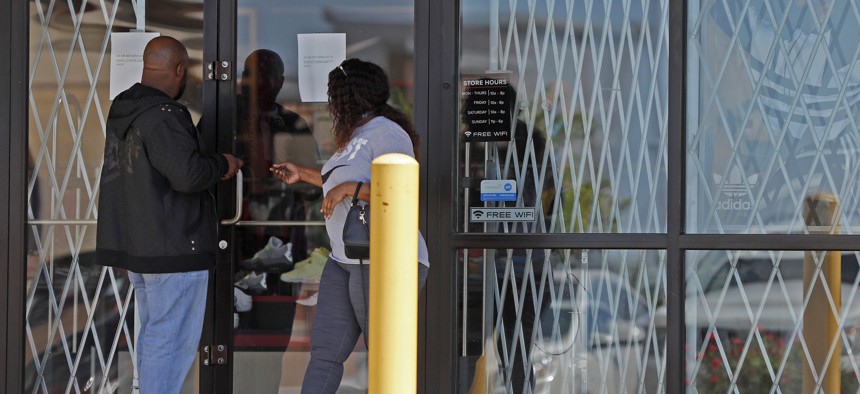States Look to Forgive Unemployment Overpayments

People are unable to enter a business closed due to the coronavirus outbreak Thursday, May 7, 2020, in St. Louis. AP Photo/Jeff Roberson
Missouri lawmakers advanced a bill that would waive the federal but not state portion of any mistakenly paid unemployment benefits.
States mistakenly overpaid millions of dollars in unemployment benefits to out-of-work residents at the outset of the coronavirus pandemic as they rushed to implement new federal programs and to provide assistance.
But rather than claw back the overpayments from residents—some of whom remain out of work or under financial hardship—states are now looking at ways to forgive the debt.
The covid relief bill signed into law in December gave states the ability to waive federal overpayments made through the Pandemic Unemployment Assistance program, which was started to aid gig workers and the self-employed. State agencies can now waive repayment of the federal benefits if the overpayments were made due to no fault of the individual worker or if requiring repayment “would be contrary to equity and good conscience.”
Ten states do not allow the waiver of unemployment overpayments, but several are in the process of changing that.
Missouri’s House of Representatives approved legislation this week that would allow the Department of Labor to forgive non-fraudulent overpayments of federal unemployment benefits granted under the CARES Act. The state’s Department of Labor identified $146 million in unemployment aid that it said was mistakenly doled out to 46,000 residents and issued notices seeking to recover the money.
“Everybody got these huge bills that were $8,000 or $9,000 and that was money they used to buy food, pay their rent or mortgage,” said Sue Greenburg, the executive director of Volunteer Lawyers and Accountants for the Arts, an organization that has helped artists appeal overpayment bills.
While Greenburg supports the fact the legislation forgives federal overpayments—about 80% of the state’s overpayments—she wishes it also waived the state portion of benefits.
Rep. J Eggleston, the bill’s sponsor, said the legislation would help residents who were mistakenly approved for benefits. But he said lawmakers felt it was necessary to keep a requirement in place that any state portion of overpayments be returned so the state’s unemployment trust fund could be replenished. Missouri employers contribute to the fund and Eggleston said it wouldn’t be fair to ask businesses to contribute more to cover the depleted costs if the money had been mistakenly distributed.
Anyone who is required to repay mistaken unemployment benefits will be able to do so in small increments and will not accrue interest, Eggleston said.
“As long as there is some sort of reasonable recovery, then they can pay it back in an affordable fashion,” Eggleston said.
The bill will now advance to the Senate, where Eggleston believes it has the support to pass.
Gov. Mike Parson initially expressed skepticism over the proposition of waivers, but said this week that he may be open to forgiving the federal overpayments.
Kentucky lawmakers are also pursuing legislation to waive overpayments and New Mexico has said it intends to begin issuing waivers soon.
In the current economic climate, states would risk harming not only individual workers by clawing back unemployment benefits but also local economies, said Alexa Tapia, a policy expert with the National Employment Law Project. Unemployment benefits helped to generate spending in local economies during the pandemic, she said. If that money was returned, out-of-work employees wouldn’t have as much to spend.
State unemployment agencies, which were overwhelmed by the nationwide surge in claims, would also have to staff up or reorganize resources in order to process a large number of repayments.
“Given the backlog and influx of claims states’ are facing, it’s definitely advantageous to exercise that equitable overpayment waiver,” Tapia said. “It does take time to go through that process.”
Andrea Noble is a staff correspondent with Route Fifty.
NEXT STORY: Cities Bet on Risky Borrowing Option to Bolster Pensions





